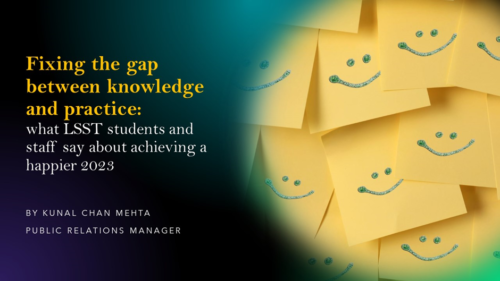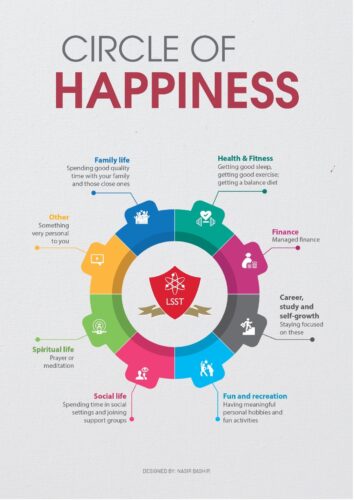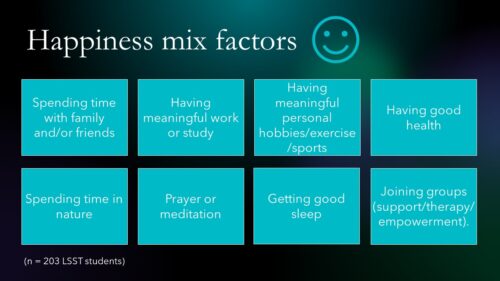Fixing the gap between knowledge and practice: what LSST students and staff say about achieving a happier 2023
By Kunal Chan Mehta | Article Date: 18 January 2023

.
LSST’s Happiness Series aims to improve happiness levels – at a time of governmental, financial and health turbulence in our societies – and joins together scientific research with examples of human experience to help LSST students and staff find a means to a more fulfilling and enjoyable way of life. In part one of this series, we question LSST students and staff about what advice they have for anyone wanting a happier 2023. The illuminating findings highlight extraordinary functional guidance:
The first part of LSST’s progressive Happiness Series aims to (1) ask and (2) ascertain what everyday happiness habits look like to educate people about their overall happiness. Subsequently, if anyone knows the answer to attaining happiness, it is those practicing it. Given that the last two years - marred by the pandemic - have not been the easiest, asking how we can create a happier year in 2023 seems more than rational.
Happiness health
Being happy is an ancient pursuit. Yet, paradoxically, the meaning of happiness, to a degree, remains subjective. Few respondents (9%, n = 203) for this study claimed to pay attention to their happiness health – or how healthy our happiness levels are. ‘For 2023, we need to make happiness and kindness an organisation-wide focus and priority,’ proclaims Irina Barariu, LSST’s Student Union President, who – as part of the Happiness Series – is currently working on increasing ‘happiness health’ with students through tailored events and activities. ‘This will positively influence everything we do whether it is study, work, family or social life.’

.
Dr. George Panagiotou, LSST’s Principal, commenting on the spirit of the Happiness Series, advocated: ‘Happiness is not a goal in life, but rather it is a by-product, and it comes from within – through the ability to manage one’s negative thoughts and consciously approach every day with optimism’. Ayan Dualeh, a Health and Social Science student at LSST’s Birmingham campus, who spoke with LSST News about finding hope amid a pandemic back in 2021, added: ‘To be happy, and for our happiness health to be high, we must choose optimism and hope. But for this to be effective we need to put work into it. This approach moved many of us at LSST through the 2020 lockdown!’.
‘Like many others, I am motivated by LSST’s Happiness Series and what it aims to achieve,’ commented Renata Carvalho, a Lecturer in Business and Course Coordinator at LSST’s Elephant and Castle campus, who is currently setting up LSST’s Women’s Health Happiness Group. ‘Happiness makes everything better, so it is imperative to have meaningful conversations on happiness and health when and how we want.’
The happiness lens
According to The World Happiness Report, the best way to focus on happiness is by concentrating on our emotional health with trusted others. Dr. Maryam Idris-Usman, a Senior Lecturer in Healthcare at LSST Birmingham, who specialises in health research methods, states: ‘Happiness is an indicator of health and wellbeing. We can improve our happiness levels through self-motivation and engaging in activities that will make us feel content. Studies have shown that education can increase our happiness and well-being.’
In a conversation with Stephanie Pena Garcia, LSST’s Mental Health and Student Wellbeing Lead, an insight into the key ingredients for happiness health, and happy living were provided: ‘Stay positively connected with other people, stay physically active and keep as open as you can about your feelings and share best practice with others.’
‘The key to happiness is knowing where to look,’ added Lynnette Douglas, LSST Birmingham’s Senior Welfare, Disability & Student Support Coordinator. ‘Try and make yourself a daily happy session where you treat yourself to your favourite music, food, book, or hobby – or anything that makes you happy.’
The psychiatrist Robert Waldinger, a director of the longest study on modern human happiness (its data reaches back to 1938), posits that the key to a happy life is the depth of our relationships and their reliability. ‘Happiness is very personal and there are innumerable elements that can impact it,’ contested Shan Wikoon, a Senior Lecturer in Business and Module Leader at LSST’s Elephant and Castle campus. ‘Our genetics and life experiences alone are unique and overwhelmingly incomparable. Thus, applying a wide-ranging happiness framework to our experiences that so vastly vary would be futile. Instead, we should go further and create – and then test – our happiness framework and habitually improve it.’
When asked about improving happiness and health, Shan added: ‘There are some general principles and practices that are effective in promoting happiness and well-being. I use the 'wheel of life' framework to assess and reflect on my happiness.’
Dr. Chinedu (Ned) Uwabuike, a Senior Lecturer in Business Management at LSST Birmingham and LSST’s Research Services Council Chair, said: ‘The perception of issues through our irrational mindset is the culprit. We, therefore, need to challenge those irrational thoughts on how we view stressors that come with the environment.’

.
A gap between knowledge and practice
From the students LSST News contacted (n = 203), it was noted that we often stick to a misdirected ‘happiness formula’ that is aimed towards wealth and worldly triumphs and that there was a large void between knowing how to be happy (high understanding) and actually practising it (low understanding). Ileana Pastorcici, a Health and Social Science student at LSST Luton, corresponds saying: ‘There is always a gap between knowledge and practice when it comes to our happiness. It can be filled by adapting to something new, remembering to live in the present and not overthinking.’ Happiness is the journey – not the destination – albeit many respondents focused on the endgame alone. ‘Once we attain our endgames, we then get bored and want to achieve the next one. It is never-ending,’ added Ileana.
Sonia Ghouri, a Lecturer in Business at LSST Luton, states that, through trial and error finesse, she practices three daily happiness habits to link knowledge to practice: self-development, practising affirmations and practising gratitude. Sonia added: ‘These happiness habits turn our thinking into doing and I share these habits with my students regularly and the outcomes are always positive.’
Discussing a practical void, Chompa Rahman, an LSST Luton Business student – and an award-winning writer on how the pandemic has changed the world – said: ‘I often ask about the dominance we place on the word happy – Happy New Year, Happy Birthday, Happy Anniversary and Happy Christmas, Happy Eid, Happy Diwali, Happy New Year and so on. We love wishing others happiness during key events – but how many times do we wish the same for ourselves?’.
The happiness mix
Dr. Wendy Wigley, LSST’s Head of Student Lifecycle and Partnerships Manager, was among the first academics surveyed by LSST News about daily routines and ‘happiness habits’. She pointed out that everyone questioned at LSST had alluded to the same common ‘happiness mix’: self-control, having meaning and purpose in life, staying connected with the right people and places, and working hard on creating a positive inner environment through mindfulness and meditation. Stephanie Pena Garcia, LSST’s Mental Health and Student Wellbeing Lead, added: ‘The findings show that happiness can be taught, measured, and improved.’
Asked if happiness was a choice, Mohammad Haider, Dean of LSST’s Wembley campus, said: ‘Certainly not. Most of it is natural and innate. We simply need to learn to practice happiness, as practice makes perfect.’
From those LSST News questioned, the ‘happiness mix’ factors highlighted (in descending order) were:
1. Spending time with family and/or friends
2. Having meaningful work or study
3. Having meaningful personal hobbies/exercise/sports
4. Having good health
5. Spending time in nature
6. Prayer or meditation
7. Getting good sleep
8. Joining groups (support/therapy/empowerment).
(n = 203 LSST students)
‘Social relationships are the building blocks of happiness,’ added Mohsin Riaz, Dean of LSST Birmingham, analysing the findings. ‘But being happy all the time is simply not possible so we must omit that goal line entirely.’ When asked what to do instead, Mohsin replied: ‘Focus on being kind, practising gratitude and having a good time. Happiness can then follow.’ Mohsin spoke of his commitment to team happiness in which he organises a purposed monthly catch-up with staff to talk about what makes them happy and unhappy at work. ‘It has proven invaluable,’ added Mohsin.

A happier 2023
The first part of LSST’s Happiness Series finds that overall happiness is not a planned priority among nearly all LSST respondents and that there is a large gap between happiness health knowledge and happiness health practice (respondents knew how to be happy but did not factor in time to actually practice being happy). Further, Syed Rizvi, Academic Dean of LSST Elephant and Castle, expressed his ‘surprise’ that only a few respondents factored in making time for their happiness: ‘We must all make time for happiness and schedule it into our daily routines,’ he said.
Dr. George Panagiotou, LSST’s Principal, surmised: ‘Happiness is not about neglecting reality, and joyful persons see things just as they are, but they are accurate and unbiased in their actions since negativity does not influence their judgment. In conclusion, experiencing happiness is a crucial requirement for success in all of life’s important endeavours and significantly increases overall wellbeing.’
Marcus Aurelius once said: ‘The happiness of your life depends upon the quality of your thoughts.’ Consequently, there is no perfect prescriptive solution to finding happiness but it is still worth identifying what works for you – and leaving what does not – and, so, therein lies happiness.
LSST News extends its utmost thanks to the students and staff that participated in this article (December 2022 - January 2023).
Further reading
Consolidating a Student Mindfulness Model: www.lsst.ac/news/pact/
How Students Can Think Positive: www.lsst.ac/blogs/positive_thinking/
How Students Can Confront COVID-19 Stress Whilst Studying From Home: www.lsst.ac/news/covid_19_stress_guide/
Mental Health in Higher Education and the Sector Challenges Ahead: www.lsst.ac/blogs/mental_health_in_he/.
Further support
How to be happier: www.nhs.uk/mental-health/self-help/tips-and-support/how-to-be-happier/
If you or a loved one are having a mental health crisis, you can call a local NHS mental health helpline for 24-hour advice and support: www.nhs.uk/service-search/mental-health/find-an-urgent-mental-health-helpline
Please email the author of this article at kunal.mehta@lsst.ac for any questions or comments - or if you would like to take part in future such articles.
The views expressed are those of the author and contributors and not necessarily those of LSST.
LSST is not responsible for content on linked and external sites.
Sharing is caring!





You are responsible for your happiness.
In fact, you create it. You attract it. You manifest it. You are the architect of your reality.
You choose your thoughts, your perceptions, and your reaction to external forces.
You possess all of the tools needed to expand your awareness, to orchestrate the evolution of your consciousness, to choose happiness, to choose love. You are that powerful Create the life you deserve. Vibrate love.
By Creig Crippen
“Happiness depends upon ourselves.” —Aristotle.
Humans have agonised over “What happiness is? ” for centuries; science has only recently begun to ponder the debate. We can control how we feel, and with a consistent approach, we can construct life-long practices for an enjoyable and fulfilling life.
Happiness is when your are healthy,the members of your familly are healthy and inside the personal circle exist a mutual understanding.
Even we all want to achieve more in our life sometimes we cannot have it all,but if you open your eyes every morning,you and your familly members are healthy you have a roof above your head and a job who can provide for you a reasonable life style ,be gratfull for everything, That is Happiness.